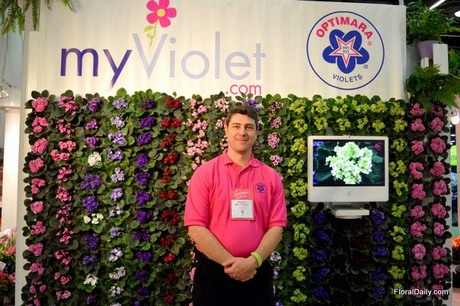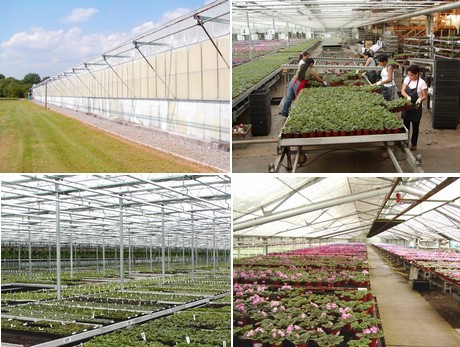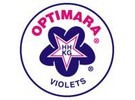
Russel Kirchner at the Cultivate'15 in Columbus (OH), United States.
Trends in color
Breeders are continuously searching for new colors, Optimara Group are too. "There are still colors that need to be invented for the African violets. True red, green and orange for example are colors that do not exist yet," says Kirchner. However, recently Optimara Group added a new color to their MyViolet series; a series that consist of varieties with bicolored flowers with a dark center and white edges, that comes close to one of these 'non-existing' colors. The new variety is called the MySensation. This variety has small and tight yellowish-greenish colored flowers and flowers for a long time. "The cross parent had a long shelf life, so regarding flowering time, the MySensation exceeds many other varieties," he says. Another trend are flowers that are spatted with different kind of colors. "In the African violet world, it is called Fantasy Style blooms," he says.
Trends in flower size
Besides color tends, there are also trends in flower size. "The next trend will be large flowered African violets. Breeding is in full swing, so we will probably come up with a new series for these large flowed varieties," says Kirchner. However, one has to think beyond following new trends. According to Kirchner, it will be a challenge to supply these varieties. "It will be difficult to ship these varieties as their large flowers can be damaged easily."
Increasing the demand
Even though the demand is starting to increase again. It is still far from the level it was in the 80's or 90's "African violets were highly popular at that time," says Kirchner. So, in order to increase the popularity of the plant and make it the most popular house plant again, Optimara Group is undertaking action and is cooperating with the African Violet Society of America (AVSA); a company that promotes the African violet. "We have a Facebook presence and we started up MyViolet.com, where we supply home growers with growing advice and variety identification."

Click here to get a virtual tour through the greenhouse.
Highly automated greenhouse
Optimara Group owns around 56 varieties and supplies them all over the US. "We supply them to different garden centers in all 50 States." The R&D facilities are situated in Nashville and in Germany, in the Rhein Valley Region. Then, the African violets of Optimara group are being propagated in Brazil, Mexico, Zimbabwe and Africa. Afterwards, they are being transported to the US and cultivated in a highly automated 13 acre sized greenhouse in Nashville. "Even though it is a quite low valued priced plant, we are still investing in techniques. We have for example, automatic spacing machines, automatic table moving systems, automatic table stacking, automatic watering, automatic shading etc." However, according to Kirchner, labor work is still of high importance. "It is always a hands-on technology, each violet is hand planted, for example."
Liners as well
Next to producing finished plants, Optimara Group also produces liners for professional growers. "We have a large assortment from which the growers can choose from," says Kirchner. "And regarding the color trends, we offer the growers mixed varieties in 4 color schemes. So we supply different, standard and special, varieties and colors in one shipment." Optimara group also visits their production greenhouses to support the grower during the cultivation process so that their plants will have the Optimara quality.
For more information

Optimara Group
Russel Kirchner
+1 615 228 2683 ext. 137
Email: russel@optimara.com
www.optimara.com
